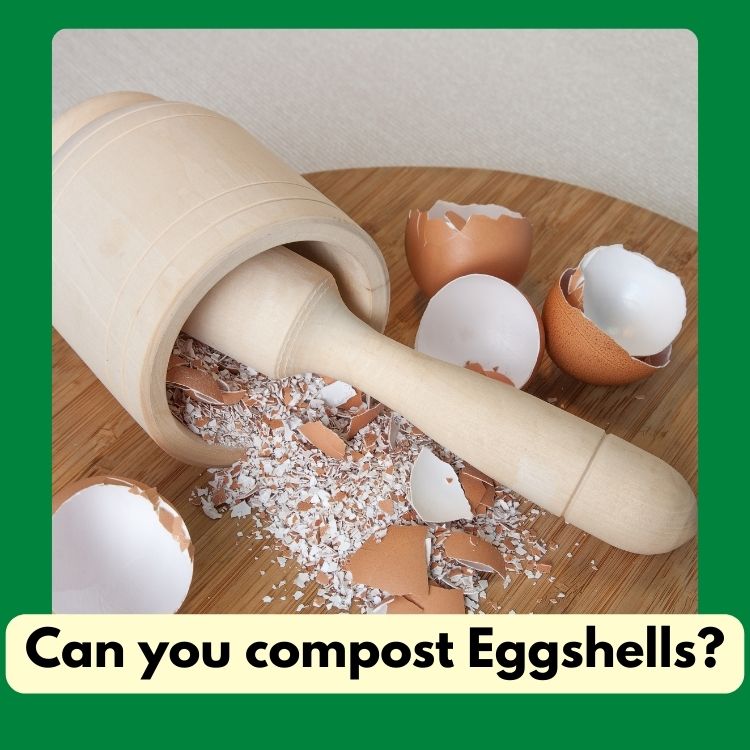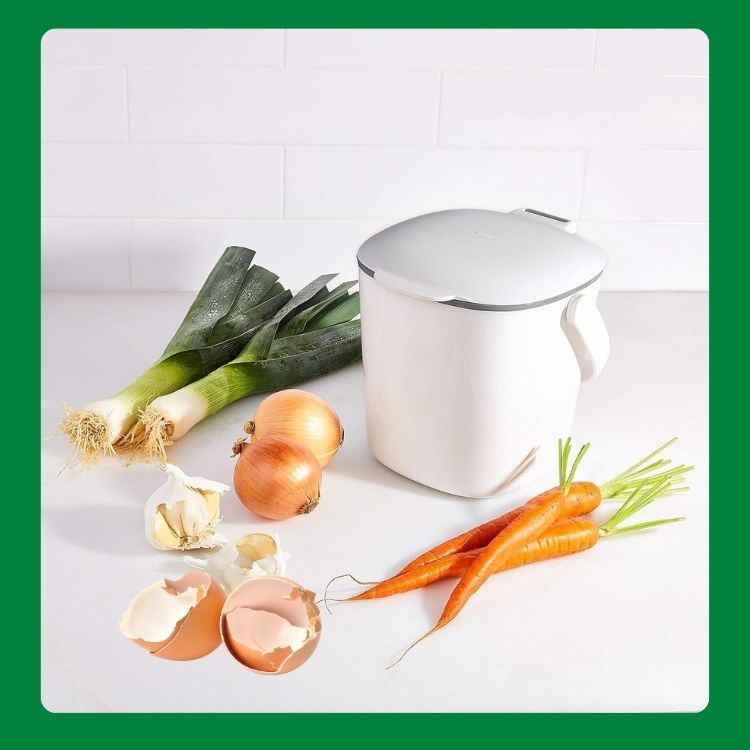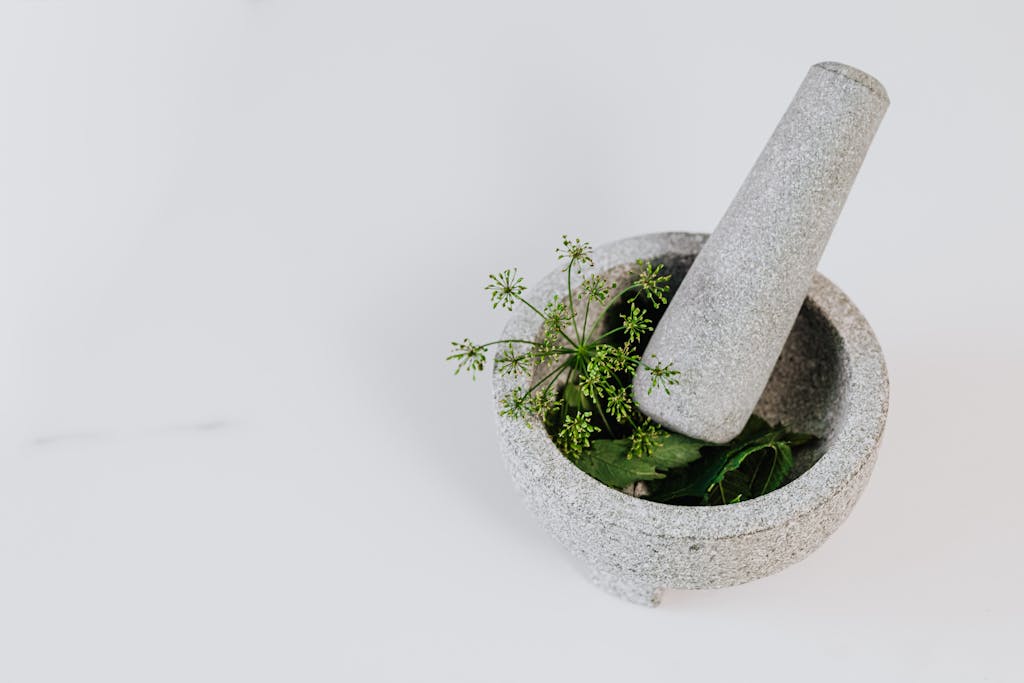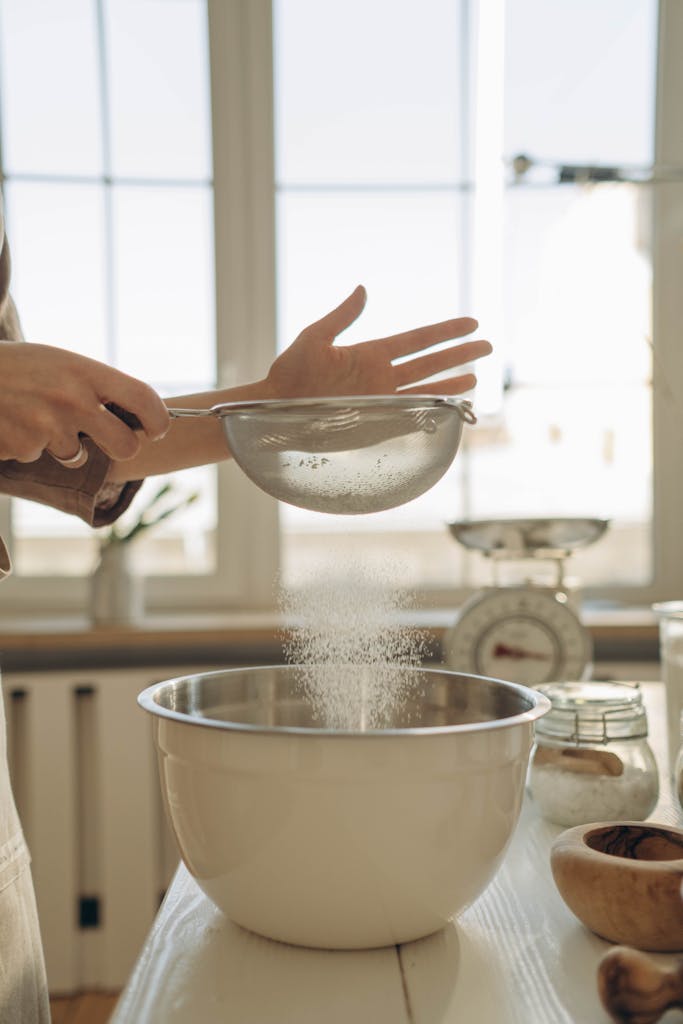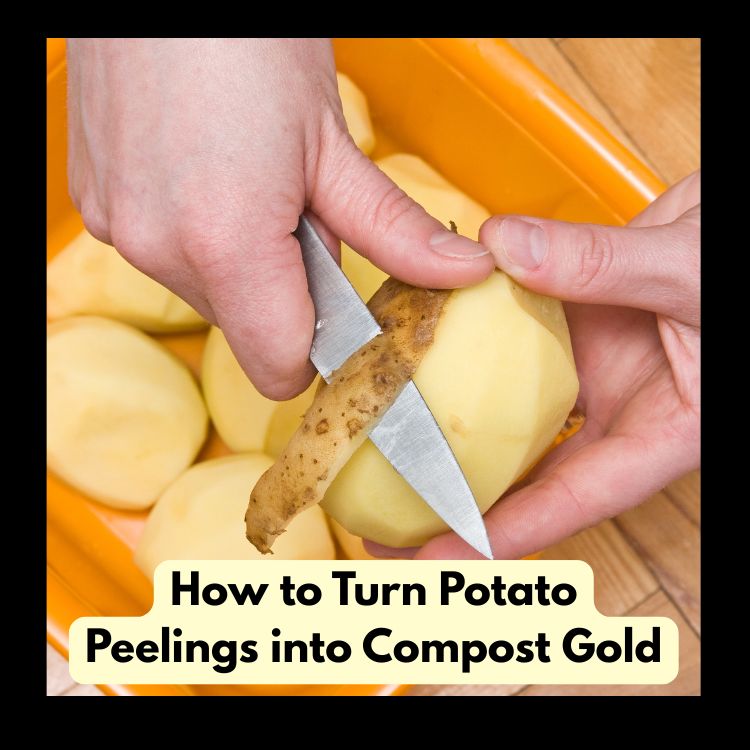Exploring composting for beginners, I’ve wondered about an answer to the question Can you compost eggshells?
Can they really help our gardens? The answer is yes, but we need to understand their role in composting.
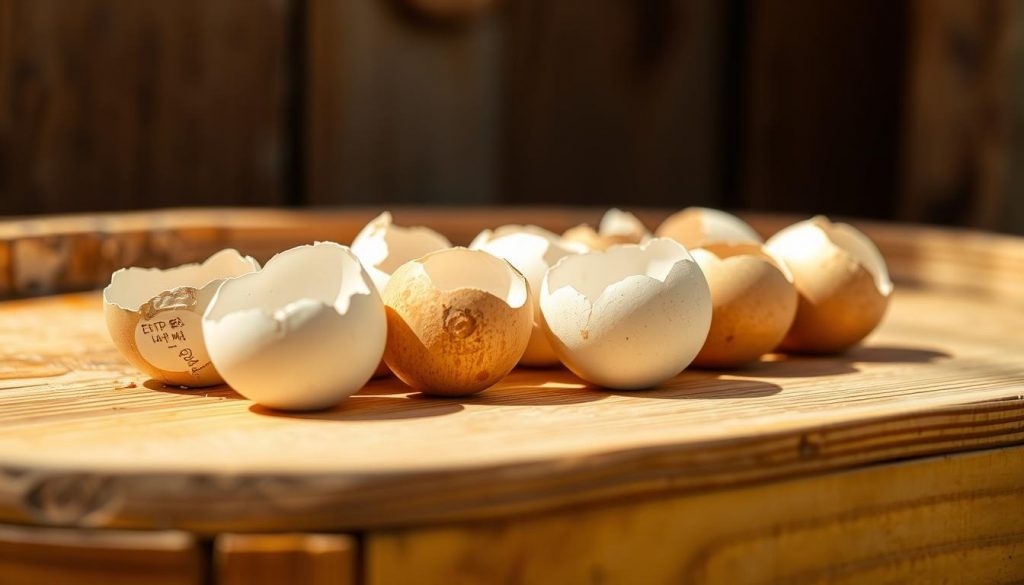
Eggshells are full of calcium and minerals that plants need to grow. Adding them to our compost makes the soil better for plants. But, we must do it right to avoid problems.
Key Takeaways
- Eggshells add calcium and minerals to the compost
- Proper preparation is key to effective eggshell composting
- Composting eggshells can improve soil health and structure
- It’s a simple way to reduce kitchen waste
- Composting for beginners can start with eggshells
The Truth About Composting Eggshells
Exploring sustainable gardening, we see the importance of composting eggshells. It’s a simple process that boosts your garden’s health.
Many wonder if eggshells are good for their compost piles.
What Happens to Eggshells in Compost
Eggshells are mostly calcium carbonate. This helps balance soil acidity and adds calcium for plants. In compost, eggshells break down into smaller pieces for plants to use.
Myths vs. Facts About Eggshell Composting
Some think eggshells attract pests or upset compost balance. But, when used right, they’re very helpful. Here are the facts:
| Myth | Fact |
|---|---|
| Eggshells attract pests to the compost. | If crushed properly, eggshells deter pests rather than attract them. |
| Eggshells make the compost too alkaline. | Eggshells can help balance soil pH if it becomes too acidic. |
| Eggshells don’t decompose. | Crushed eggshells decompose over time, adding calcium to the soil. |
Knowing the truth about composting eggshells helps gardeners. They can add this kitchen waste to their compost, making their soil richer.
Benefits of Adding Eggshells to Your Compost
Adding eggshells to your compost pile is a simple yet effective way to boost your soil’s fertility.
Eggshells are rich in calcium and other minerals that are essential for healthy plant growth.
By incorporating them into your compost, you’re not only reducing waste but also creating a nutrient-rich soil amendment.
Calcium and Mineral Content
Eggshells are primarily composed of calcium carbonate, a compound that provides calcium, a crucial nutrient for plants.
Calcium helps in cell wall development and root growth, making it an essential element for plant health.
The addition of eggshells to compost increases the calcium content, benefiting plants that require high levels of calcium, such as tomatoes and peppers.
Soil Structure Improvement
Eggshells also contribute to improving soil structure. When crushed and added to compost, they help to increase the porosity of the soil.
This improved porosity allows for better aeration and water infiltration, creating a more favorable environment for root growth and microbial activity.
As a result, the overall health and fertility of the soil are enhanced.
pH Balancing Properties
Furthermore, eggshells have pH balancing properties. Calcium carbonate in eggshells can help neutralize acidic soils by raising the pH.
This balancing effect creates a more stable environment for microbial activity in the compost, facilitating the breakdown of organic matter into a rich, humus-like material.
By understanding the benefits of adding eggshells to your compost, you can make the most of this readily available resource.
This enhances your soil’s health and your garden’s productivity. Incorporating eggshells into your composting routine is a step towards more sustainable and effective gardening practices.
Preparing Eggshells for Composting
Before adding eggshells to your compost, it’s crucial to prepare them properly.
This ensures they decompose efficiently and help create a healthy compost ecosystem.
Proper preparation involves several steps. First, clean the eggshells. Cleaning eggshells properly is essential.
It removes any residual egg white or yolk that could attract pests or create odors in your compost.
Cleaning Eggshells Properly
To clean eggshells, simply rinse them under running water. For more thorough cleaning, soak them in water for a few minutes. This step is crucial for maintaining a clean compost pile.
“Cleaning your eggshells before composting is a simple yet effective way to prevent potential problems in your compost pile.”
Crushing vs. Grinding: Which Method Works Best
After cleaning, the next step is to crush or grind the eggshells. Crushing eggshells into smaller pieces helps them decompose faster. While both crushing and grinding work, grinding is more effective.
It increases the surface area exposed to microorganisms.
| Method | Effectiveness | Decomposition Speed |
|---|---|---|
| Crushing | Moderate | Medium |
| Grinding | High | Fast |
Storage Solutions Before Composting
If you’re not ready to add eggshells to your compost immediately, it’s essential to store them properly. Keep them in an airtight container to prevent attracting pests.
This simple storage solution will keep your kitchen waste organized and your eggshells ready for composting.
By following these steps, you can ensure that your eggshells are well-prepared for composting.
This will ultimately enrich your soil with valuable calcium and minerals.
Step-by-Step Guide: How to Compost Eggshells
Composting eggshells is a simple way to cut down on kitchen waste. It turns waste into nutrient-rich soil for your garden.
Just follow a few easy steps to make it happen.
Collecting and Storing Eggshells
First, collect and store eggshells properly. Rinse them to remove egg white or yolk. This stops pests and odors. Dry them in the oven or air dry.
Keep them in a container until you have enough for compost.
Processing Eggshells for Faster Decomposition
Crush or grind eggshells to speed up decomposition. This makes them easier for microorganisms to break down.
Use a mortar and pestle, coffee grinder, or rolling pin to do this.
Adding Eggshells to Your Compost Pile
When adding eggshells to your compost, balance them with other materials. Eggshells are high in calcium and carbon.
Mix them with nitrogen-rich materials like vegetable scraps or grass clippings. This balance keeps your compost healthy.
Proper Layering Techniques
Layering is key in composting. Start with coarse materials like twigs or straw for better airflow. Alternate between green and brown materials, ending with a brown layer on top.
Add eggshells to green layers for even distribution. This method helps decomposition and maintains the right balance.
| Layer | Material | Purpose |
|---|---|---|
| Bottom | Twigs or Straw | Airflow and Drainage |
| Middle | Green Materials (e.g., Vegetable Scraps) | High Nitrogen Content |
| Middle | Brown Materials (e.g., Eggshells, Dried Leaves) | High Carbon Content |
| Top | Brown Materials | Retains Moisture and Suppresses Weeds |
By following these steps and keeping your compost balanced, you can compost eggshells effectively.
This enriches your garden soil, reduces waste, and supports sustainable gardening.
Can You Compost Eggshells in Different Systems?
Eggshells can be composted in many ways, depending on your setup. This makes it easy for gardeners to add eggshells to their composting routine.
Traditional Compost Piles and Bins
If you use traditional compost piles or bins, you can add eggshells directly. It’s important to crush them first to help them break down faster.
This method is simple and effective, adding calcium and minerals to your compost.
Vermicomposting with Eggshells
Vermicomposting, or worm composting, is another good option. Eggshells give grit to the worms, helping them digest food.
But, make sure to crush the eggshells and keep the pH balanced to protect the worms.
Bokashi Composting and Eggshells
Bokashi composting ferments organic matter, including eggshells. It’s great for breaking down eggshells quickly. J
ust remember to follow Bokashi guidelines to keep the fermentation process right.
Composting Eggshells in Apartment Settings
Apartment dwellers can compost eggshells using indoor methods or small bins. Crushing eggshells is key in these settings to avoid odors and pests.
| Composting Method | Eggshell Preparation | Benefits |
|---|---|---|
| Traditional Compost Piles/Bins | Crush eggshells | Adds calcium and minerals |
| Vermicomposting | Crush eggshells finely | Provides grit for worms |
| Bokashi Composting | Can be added whole or crushed | Effective fermentation |
| Apartment Composting | Crush eggshells finely | Reduces odors and pests |
Understanding different composting systems and how to adapt eggshell composting to each is key. Gardeners can then fully utilize this nutrient-rich waste material.
The Science Behind Eggshell Decomposition
The science of eggshell decomposition shows how they help in organic gardening with eggshells. Eggshells are mostly calcium carbonate.
This compound is key for soil health.
Breakdown Process of Calcium Carbonate
Calcium carbonate in eggshells turns into calcium and carbonate ions. These ions help plants and microorganisms.
The compost pile’s acidity helps this process.
Factors Affecting Decomposition Rate
Many things affect how fast eggshells decompose. Moisture, temperature, and the compost’s carbon-to-nitrogen ratio matter. Maintaining optimal conditions is key for fast decomposition.
| Factor | Effect on Decomposition |
|---|---|
| Moisture | Increased moisture accelerates decomposition |
| Temperature | Higher temperatures facilitate microbial activity |
| Carbon-to-Nitrogen Ratio | A balanced ratio ensures optimal microbial activity |
Microbial Activity and Eggshells
Microorganisms are crucial in breaking down eggshells. They use enzymes to dissolve calcium carbonate. This makes it available to plants.
Promoting microbial activity is vital for effective eggshell composting.
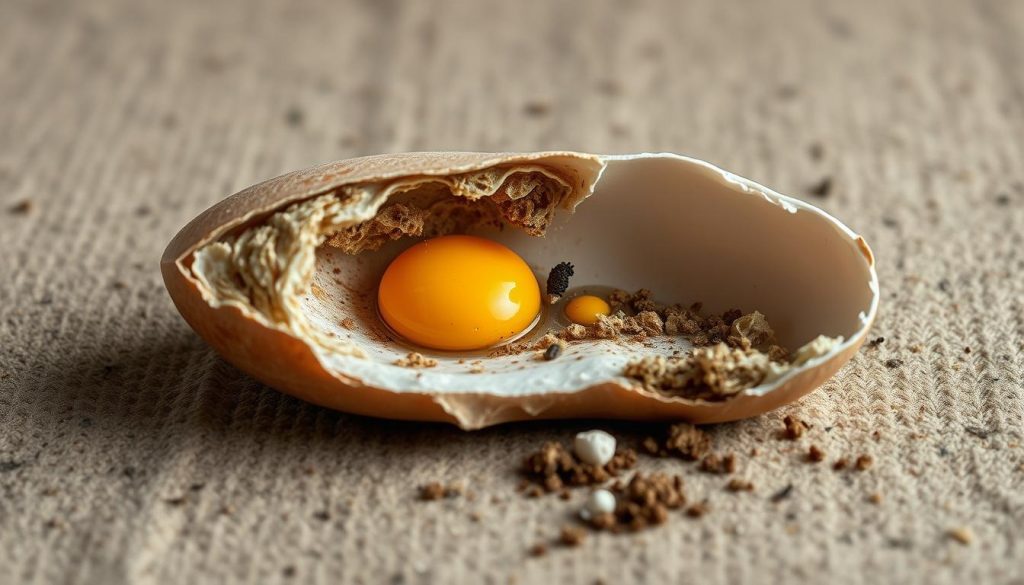
Combining Eggshells with Other Kitchen Waste
Mixing eggshells with other kitchen waste boosts your composting. This mix creates a rich compost for your garden.
Balancing Green and Brown Materials
To compost eggshells well, balancegreen and brown materials. Green stuff like fruit and veg scraps have lots of nitrogen. Brown stuff, like dried leaves, has lots of carbon.
Eggshells are brown because they’re full of calcium.
A mix of 2/3 brown and 1/3 green is best. This keeps your compost pile healthy.
Ideal Kitchen Waste Combinations
Eggshells go well with kitchen waste like coffee grounds and tea bags. These add nutrients to your compost.
Coffee grounds add nitrogen, and eggshells add calcium.
What Not to Mix with Eggshells
Don’t mix eggshells with meat, dairy, or oily foods. They attract pests and smell bad. Also, skip weeds with seeds to avoid sprouts in your compost.
Knowing how to mix eggshells with other waste makes your compost better.
It turns into a great soil amendment for your garden.
Common Mistakes When Composting Eggshells
To get the most out of composting eggshells, it’s important to avoid common mistakes. These mistakes can slow down the decomposition process.
Eggshells can be very useful in compost, but they need to be added correctly.
Not Crushing Eggshells Finely Enough
One big mistake is not breaking eggshells into small pieces. Big pieces take longer to break down. Crushing them finely makes them decompose faster and evenly.
This ensures they mix well with the compost.
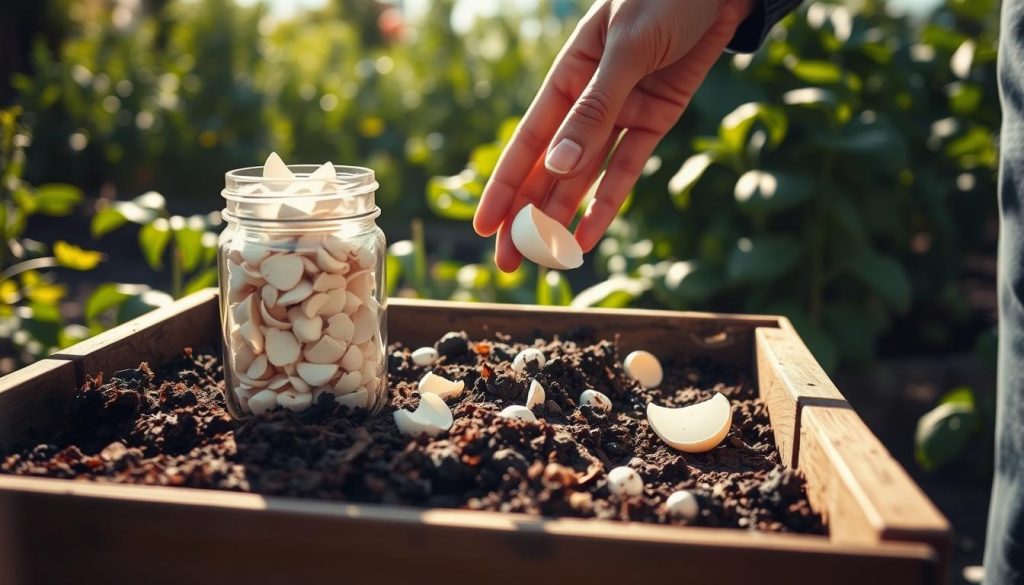
Adding Unwashed Eggshells
Another mistake is adding unwashed eggshells. They can have egg residue that attracts pests and smells bad. Washing eggshells before adding them helps avoid these problems.
Imbalanced Carbon-to-Nitrogen Ratio
It’s vital to keep the carbon-to-nitrogen ratio balanced in composting. Too many eggshells (high in calcium carbonate) can upset this balance.
Mixing “green” and “brown” materials is essential for good composting.
Troubleshooting Eggshell Composting Issues
Troubleshooting is key to successful eggshell composting.
It helps solve common problems like slow decomposition, bad smells, and pests.
Eggshells Not Decomposing
Large eggshells or too little moisture can slow down decomposition. Crush eggshells finely before adding them.
Also, keep the compost moist and turn it often.
Odor Problems and Solutions
Bad smells can happen if the compost is too wet or has the wrong mix of materials. To fix this, add dry materials like leaves or straw.
They soak up extra moisture and balance the mix.
Pest Attraction and Prevention
Pests might be drawn to compost with eggshells if not managed right. Make sure eggshells are mixed in well.
Turn the compost often and keep the mix balanced to keep pests away.
| Issue | Cause | Solution |
|---|---|---|
| Eggshells Not Decomposing | Insufficient crushing, inadequate moisture | Crush eggshells finely, maintain optimal moisture |
| Odor Problems | Excess moisture, imbalanced C:N ratio | Add brown materials, balance C:N ratio |
| Pest Attraction | Poor compost management | Turn compost regularly, balance composition |
Beyond Composting: Direct Garden Applications for Eggshells
Exploring organic gardening, I found eggshells have many uses beyond composting.
They are a great resource for gardeners wanting to be more eco-friendly.
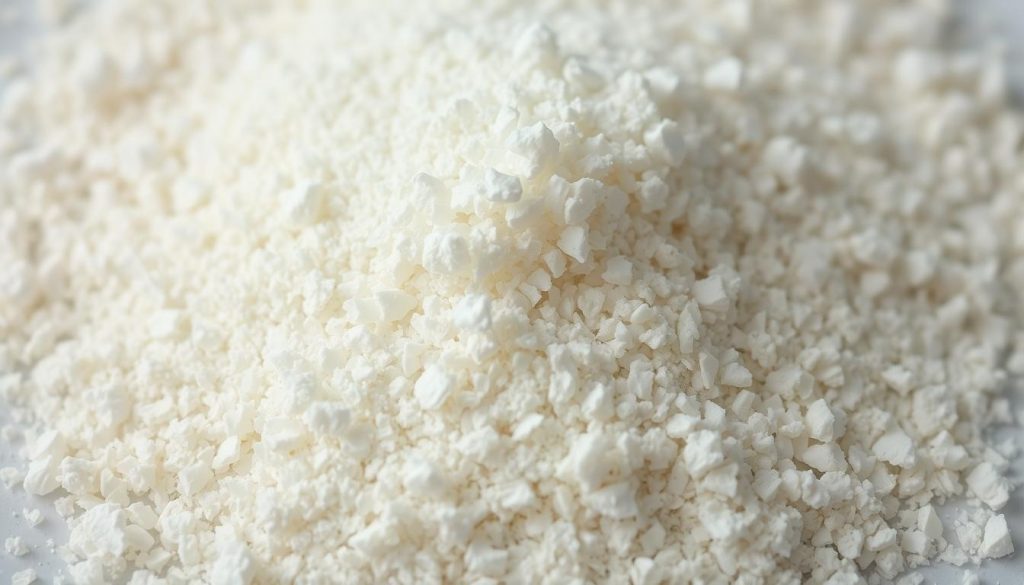
Eggshell Tea for Plants
Eggshells can be turned into eggshell tea, a liquid fertilizer. It’s made by steeping crushed eggshells in water. Then, use this solution to water your plants.
This natural fertilizer helps plants grow strong and healthy.
Eggshells as Pest Deterrents
Eggshells can also keep pests away from your garden. Crushed eggshells around plants keep slugs and snails off. These pests don’t like the sharp edges.
It’s a safe way to protect your plants.
Seed Starting in Eggshell Containers
Eggshells can be used as mini pots for starting seeds. Fill them with soil, plant your seeds, and put them in an egg carton.
When the seedlings are big enough, you can transplant them directly into the garden. The eggshells will break down and add nutrients.
Using eggshells in your garden can help reduce waste and make gardening more sustainable. These methods are easy and effective, whether you’re new to gardening or have been doing it for years.
Plants That Love Eggshell Compost
Eggshell compost is great for plants that need a lot of calcium. It makes the soil better and keeps pests away.
Let’s see which plants do well with eggshell compost.
Tomatoes and Peppers
Tomatoes and peppers love eggshell compost. It stops blossom-end rot, a big problem for them.
Adding eggshell compost makes their fruits grow better and their plants stronger.
Leafy Greens and Brassicas
Leafy greens like kale and spinach, and brassicas like broccoli and cauliflower, also benefit. They get calcium and minerals from eggshell compost. T
his helps their leaves grow well and boosts their garden’s yield.
Flowering Plants and Fruit Trees
Flowering plants and fruit trees also get a lot from eggshell compost. The soil gets better, and they get more calcium.
This means they bloom more vibrantly and produce healthier fruit.
Here’s a quick look at how different plants benefit from eggshell compost:
| Plant Category | Benefits of Eggshell Compost |
|---|---|
| Tomatoes and Peppers | Prevents blossom-end rot, promotes healthier fruit |
| Leafy Greens and Brassicas | Supports healthy leaf development, enhances yield |
| Flowering Plants and Fruit Trees | Improves soil structure, promotes vibrant blooms and healthy fruit |
Sustainable Kitchen Practices: Integrating Eggshell Composting
Exploring sustainable kitchen practices, I’m thrilled to share how eggshell composting can help. This simple habit reduces kitchen waste and makes cooking more eco-friendly.
Creating a Kitchen Compost Collection System
To compost eggshells well, you need a kitchen compost system. Just use a bin or container on your countertop for eggshells and other scraps.
Reducing Waste Through Composting
Composting kitchen waste, like eggshells, cuts down landfill waste. It also makes nutrient-rich soil for your garden.
Teaching Children About Composting
Getting kids involved in composting teaches them about sustainability. It’s a great way to start them on eco-friendly habits early.
| Benefits | Description |
|---|---|
| Reduces Kitchen Waste | Composting eggshells decreases the amount of waste sent to landfills. |
| Creates Nutrient-Rich Soil | Eggshell compost adds calcium and other minerals to the soil, improving its structure. |
| Educational Opportunity | Teaching children about composting promotes sustainability and eco-friendly habits. |
FAQ
Can I compost eggshells in my backyard compost pile?
Yes, you can add eggshells to your backyard compost pile. They are rich in calcium and minerals that help plants grow.
How do I prepare eggshells for composting?
Rinse eggshells with water to remove any leftover egg. Then, crush or grind them into smaller pieces. This makes them break down faster in the compost pile.
Will composting eggshells attract pests to my compost pile?
Eggshells can attract pests if not handled right. To prevent this, bury them deep in the compost pile. Cover them with other materials and keep the compost balanced.
Can I compost eggshells in a vermicomposting system?
Yes, you can compost eggshells in a worm composting system. Just crush them finely and add them in small amounts to protect the worms.
How long does it take for eggshells to decompose in compost?
Eggshells decompose at different rates based on temperature, moisture, and size. Crushed eggshells usually take months to a year to fully break down.
Can I use eggshell compost for indoor plants?
Yes, you can use eggshell compost for indoor plants. It adds beneficial minerals and improves soil structure. Just make sure the compost is fully finished and safe.
Are there any plants that don’t benefit from eggshell compost?
Most plants benefit from eggshell compost’s calcium and minerals. But, plants that like acidic soils, like blueberries or rhododendrons, might not do well. This is because eggshell compost can make the soil too alkaline.
Essential kit to get you started
OXO Good Grips Compost Bin (£20-£25)
This countertop compost bin is perfect for collecting eggshells and other kitchen scraps before they head to your main compost pile.
It’s small (about 1.75 gallons), has a tight-sealing lid to keep odors in, and a handle for easy carrying.
The smooth interior makes it a breeze to clean, which is great for dealing with sticky egg residue. Linking to this gives readers an affordable way to organize their composting routine right from the kitchen.
Why it’s great: Encourages daily eggshell collection without mess or smell.
A simple, no-frills outdoor compost bin that’s ideal for beginners composting eggshells and other waste. It’s made from recycled plastic, has a decent capacity for small gardens, and is easy to set up on soil.
Eggshells break down well in a bin like this when mixed with greens and browns.
It’s a great entry-level option for readers who don’t want to splurge on fancy tumblers.
Why it’s great: Cheap, durable, and perfect for composting eggshells in a backyard setup.
Tera Stainless Steel Pestle and Mortar (£10-£15)
Crushing eggshells before composting speeds up decomposition, and this affordable pestle and mortar is a handy tool for the job. It’s compact, easy to use, and doubles as a kitchen gadget for spices
Why it’s great: Makes eggshells break down faster in compost, plus it’s versatile.
Galvanised Soil Sieve (£8-£12)
A soil sieve is super useful for sifting finished compost to remove any eggshell bits that haven’t fully broken down.
This one’s lightweight, rust-resistant, and cheap, making it a great add-on for readers who want smooth, ready-to-use compost for their gardens.
Why it’s great: Helps refine compost for a polished finish, especially with stubborn eggshell fragments.
Conclusion
Composting eggshells is a simple way to cut down on kitchen waste. It also makes a nutrient-rich soil amendment for your garden.
By learning about composting eggshells, you start a greener gardening journey.
Composting eggshells helps reduce landfill waste. It also adds calcium and minerals to your plants. This improves soil structure, balances pH levels, and boosts microbial activity.
So, composting eggshells makes your garden healthier and more sustainable.
Now, you know how valuable composting eggshells is. I urge you to try it out. Follow the tips from this article and see your garden flourish.
The benefits of composting eggshells will show in your garden’s health and productivity.

